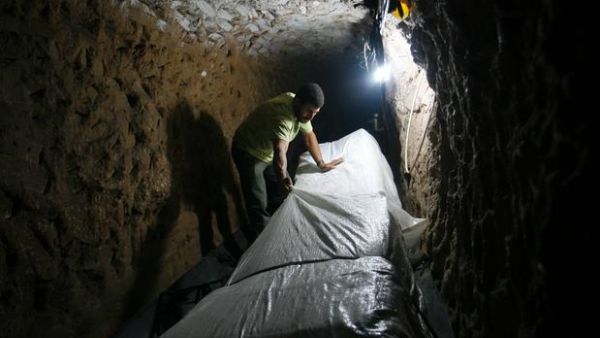Since the blockade first came into effect seven years ago, the Hamas-led government in the Gaza Strip succeeded repeatedly in overcoming its economic crises. However, the Palestinian Islamist movement, whose budget heavily depended on Iranian and Syrian support – and then the Muslim Brotherhood – has all but lost its erstwhile allies.
When Hamas endorsed the armed opposition in Syria, Iran suspended aid to the Islamist group. Then, when the Egyptian army toppled president Mohamed Mursi and the Muslim Brotherhood-led administration in Egypt, Hamas’ problems deepened, with 90 percent of tunnels destroyed and the blockade on Gaza tightened.
But despite its weakness and despair, Hamas has refused to surrender to its fate. Ziad al-Zaza, Hamas’ deputy prime minister, said, “Hamas has faced many crises since the beginning of the blockade on the Strip, but was able to overcome them. I am confident we will be able to overcome the current crisis as well.”
According to the Ministry of Finance in Gaza, Hamas has to pay up to $37 million each month in salaries for more than 50,000 civil servants and security officers. Monthly revenues from the tunnels had previously accounted for nearly 40 percent of the Hamas government’s budget, shortly before Mursi’s ouster.
Palestinian analysts believe that time alone is not enough to resolve the crisis and that Hamas must look for alternative allies before the situation gets worse. Speaking to Al-Akhbar, Adnan Abu Amer, political analyst, said, “Hamas does not live alone in the Strip, and is now in a real crisis. For this reason, it must mend its relations with Iran.”
However, political analyst Talal Okal, who also spoke to Al-Akhbar, believes that Hamas must reassess its relationship with Egypt first and foremost. The relationship was damaged on account of Hamas’ support for Mursi, he said, and as a result, Egypt has stepped up restrictions on Hamas. Okal then reckoned that the time was too late for Hamas to search for comfortable solutions.
Political analyst Akram Atallah agrees with Okal. Atallah told Al-Akhbarthat Hamas must completely refrain from any escalation against Egypt, including in the media. Atallah said that the last thing Hamas needs is a new confrontation with the Egyptian army, the only party that controls Gaza’s – and Hamas’ – lifeline by virtue of its geographical location. Atallah said, “No sane person believes that the people of Gaza would look for animosity with Egypt, their only connection to the outside world.”
Recently, and for the first time since the start of the blockade, Israel agreed to let around 70 truckloads of construction materials daily into the Gaza Strip through the Kerem Shalom crossing. However, this is not nearly enough to offset the losses from the closed tunnels.
According to the Palestinian Federation of Industries, there is a large shortage in building materials, pushing prices up and overall construction activity down. The Ministry of Economy in Gaza estimates the Strip’s daily building material needs at about 6,000 tons of gravel; 4,000 tons of cement; and 1,500 tons of corrugated iron.
Abu Naji al-Shaer, owner of a tunnel dedicated to hauling building materials, could not conceal his anger against the ruling government in Gaza. He said, “At all times, Egypt and Israel would threaten to destroy the tunnels, but only a small part of the tunnel network would end up being affected. Now thanks to Hamas, my children’s livelihood and mine has been destroyed because of its support for the Muslim Brotherhood and Hamas’ meddling in Egyptian affairs.”
“Now that we lost the tunnels, let’s see how Hamas will solve the problem,” he added.
How will Hamas do that? This is a question that many in Gaza are asking. After all, Hamas is not just an Islamist group with a military wing resisting the occupation – it is also a government controlling an area inhabited by 1.8 million people who depend on Hamas for their welfare.
By: Fatima Abdallah








